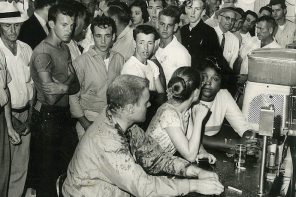Much ado has been made about Senator Harry Reid’s racially anachronistic yet somewhat accurate description of the American electorate when it comes to racial preference. An African American of a lighter hue who belies all of the cultural markers that are often associated with “blackness” has a better chance of broad success in America. Well, as someone of “Negro dialect” might say, “No S*%t Sherlock!”
Intraracial discrimination and privilege based on the color of one’s skin extends back to the antebellum South. And many people of color are well versed at linguistic code-switching depending on the context. So why should I be offended by Senator Reid’s astute observation?
If anyone should be offended it should be the critical mass of Americans, of all racial, ethnic and political perspectives, who are so informed by the logic of white supremacy that they fail to interrogate the correlations between dark skin tone and negativity or lightness and positive attributes. Not to mention the way persons uncritically privilege the southern drawls of Bill Clinton, the effete New England vernacular of George H. W. Bush or grammatically obtuse ramblings of George W. Bush over any voice tonality and timbre that may reveal one to be African American.
This is why the feigned outrage from the political right is so vexing. For Michael Steele—the GOP’s racially-cynical token selection in light of President Obama’s election—to assert that Senator Reid’s comments are the equivalent of Senator Trent Lott’s past suggestion that segregation would have been good for America is plain asinine. Particularly in light of Senator Reid’s legislative record supporting causes that benefit voters of color. When interpreting racial discrimination, the totality of one’s actions matters.
There is one major problem that I do have with Senator Reid’s statement, however. For him to contend that President Obama has “no Negro dialect” reveals a parochial comprehension of the breadth and artistic beauty of black vernacular culture. President Obama is most lauded for his gifted rhetorical ability. His persuasive use of narrative, rhythmic timing, and common employment of alliteration and assonance are all creative staples of the African American homiletic tradition.
Whether Richard Allen, France Haper, Barbara Jordan or Martin Luther King, Jr., President Obama in many ways extends this rhetorical ritual of performed religious and political speech. Just because one doesn’t sound like Mushmouth from Fat Albert or use the imaginary “jive” language from the movie Airplane does not mean that one is not informed by African American linguistic constructions. Maybe if Senator Reid embraced a little more “Negro dialect” like his president, he might not sound so “inartful” when describing the American electorate in the future.



